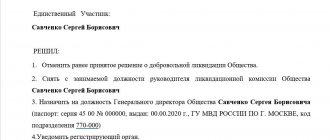The desire to register property as common shared ownership (CHP) most often arises in relation to residential real estate. Several people can privatize or buy housing, receive it as a gift or by inheritance. You can legally own a share in it and dispose of it only after registering your right in the Unified State Register (USRN).
To do this, you will need to provide documents confirming your right to a share and check the availability of real estate in the cadastre. But you always need to start by obtaining the consent of all potential owners. If someone is against dividing the common property into shares, only the court can help. There are a lot of nuances in registering real estate, which can sometimes only be taken into account with the help of lawyers.
What documents are needed to register common shared ownership?
Common shared property is property that is owned by everyone together, but with each person's share determined. A share can be real (for example, a part of a house or a room in an apartment), but more often it is ideal, that is, abstract. This part exists only on paper and is designated by a fraction: 1/2, 1/3. According to the Civil Code, the shares are equal, but by agreement they can be changed in any ratio. In controversial situations, the size of the parts is determined by the court.
Registration of real estate in Rosreestr involves registering your home and recording your right to it. Moreover, according to a simplified procedure, this can be done simultaneously. To register an ODS, three conditions must be met.
Firstly, it is necessary to obtain the consent of all future owners or obtain it through the court. In some cases, legal agreements can only be formalized by a notary. However, from July 31, 2019, after the entry into force of Federal Law No. 76 of May 1, 2019, the participation of a notary is no longer required for many transactions with shares.
Secondly, the property must be registered in the Unified State Register of Real Estate and assigned a unique number. If it is not there, you need to add it. There are definitely apartment buildings there, but the village or country house that you inherited may well not be there. Then you need to submit an application and call a cadastral engineer. Without registering real estate in the cadastral register, registration of rights to it is impossible.
Thirdly, you must have title documents. That is, those on the basis of which the right to register part of the housing as property arises (they are called just that - foundation documents). Which ones exactly depend on the method of acquisition. It could be:
- contract of sale;
- privatization agreement;
- deed of gift;
- will;
- court decision recognizing the right to real estate.
Common shared property can also be formed from joint property when it is divided into parts. This is possible by agreement of the owners (voluntarily or through the court) or by concluding a marriage contract if the property is shared by spouses.
Common ownership of property - what is it?
Apartments can be owned not only by a single person, but also in common ownership. For example, several heirs did not renounce their shares in favor of one person, but registered ownership for all of them.
In this case, common property is of two types:
- joint;
- shared
Joint ownership of an apartment means that the owners have the same rights to housing, that is, their shares are not determined in percentage or numerical terms. Joint ownership, in this case, can be registered as for two owners, and they both have certificates in hand, or maybe for one.
This often happens when an apartment is purchased during marriage. Even if the certificate is issued only for the husband or wife, the apartment is considered shared.
Common shared ownership is a type of ownership where the shares are physically defined. In the certificate for the apartment they are indicated in fractional terms, for example ½ or 234/6547 shares in the right.
In what cases is notarization necessary?
Buyers of SDS cannot do without a notary if they are spouses, because according to the law, all their property is joint. If they want to register ownership by shares, they need to stipulate this in the marriage contract, and it can only be concluded by a notary. As for the purchase and sale of shared real estate, the restrictions apply, for the most part, to sellers, that is, to its alienation.
Since July 31, 2021, a new version of the Law on State Registration of Real Estate has been applied, which abolished the mandatory notarization of a number of transactions. So, now it is possible to sell real estate located in the UDS without a notary, upon a simple written application. But under one condition - the alienation of property must be formalized in one transaction, i.e. everyone sells their shares at the same time.
Deeds of gift, wills and inheritances, as well as all transactions involving minors and incapacitated citizens, must be certified by a notary.
You do not need a notary if you are simply redistributing existing shares among the same owners. For example, there were 1/2 for two, and now you want to make 9/10 and 1/10. In many cases, it is also possible to draw up an agreement for the acquisition of shares in real estate without the presence of a notary - for example, if it is:
- privatization of family real estate;
- purchase of real estate from a sole owner;
- purchase from spouses who own the apartment jointly.
If you cannot do without notarization in your case, then this document is added to the general list of documents required for registration of the ODS. Now all that remains is to pay the state fee and attach the receipt to the package of documents.
Rights of share owners
Legislatively, the rights of owners to a shared apartment are enshrined in Article 209 of the Civil Code. Let us list them and focus on individual issues.
Each owner of an apartment in common ownership has the right to:
- own property belonging to him by right of ownership;
- dispose, including carry out transactions for sale, exchange or rental;
- exploit your property.
However, only its sole owner can fully and solely dispose of his property without approval. Common ownership implies several participants whose rights cannot be violated. Therefore, the listed actions can only be performed with the consent of the remaining owners. A negative decision by one of them will lead to the fact that actions regarding common property will be considered unlawful.
It is often easier to find a compromise than to resolve the case in court. But it is not always possible to maintain normal relationships; conflicts here are frequent and sometimes difficult to resolve.
If the rights of any of the owners are violated, he can go to court, which will help resolve the situation. At the same time, his legal right to demand a part of the property equal to his share, to provide ownership for disposal and operation. In the absence of such an opportunity, he may demand a monetary payment from the remaining owners of the common property in an amount proportional to the value of his share.
According to the principle of freedom of agreement, the court cannot oblige other owners of shares in the apartment to give their consent to the alienation or rental of the declared part. This is a coercive measure that is contrary to principle. Therefore, the parties must still come to a common decision and agreement.
If shares of property are allocated in kind, then the owner of his part of the apartment can fully dispose of it without coordinating his actions with other shared owners. But they have a pre-emptive right to repurchase if the share is sold.
Renting out common property brings in some income. It must be distributed among the apartment owners in equal shares.
How to pay the state fee?
Everyone who registers their ownership of real estate is required to pay the state duty. Only low-income people who are legally recognized as such are exempt from paying it. For minors under 14 years old, parents pay on their own behalf, and if children are between 14 and 18 years old, then payment is made on their behalf.
Currently, the state duty is 2,000 rubles for all buyers. Everyone must pay on their own behalf in proportion to their share in the property. For example, if your share is 1/4, then when multiplied the cost will be 2000*1/4=500 rubles.
When buying a house with land, there must be a separate receipt for each object. The size of the state duty for a plot depends on the category: 350 rubles for agricultural land, personal farming and individual housing construction, 2000 rubles - in populated areas.
Separately, duties are provided for the acquisition of property as a result of donation and inheritance. Heirs, for example, pay 2,000 rubles each. Receipts for payment of fees in the name of each participant must be included in the general package of documents.
You can pay the fee yourself (the details are on the Rosreestr website), but it is easier to do this when submitting an application to the MFC. The law allows you to wait up to 5 days for payment. You have the right to refuse to accept documents, but the registration itself will not begin until the fee is paid.
Is it possible to purchase an apartment from two owners using maternal capital?
Of course, it is possible that the legislator does not establish any obstacles to purchasing an apartment with maternity capital. But, as a rule, the cost of housing significantly exceeds the amount of maternity capital, so an additional payment from personal funds is required. When using maternity capital to improve housing conditions, all mandatory actions required by law are required (purchase of real estate only on the territory of the Russian Federation, registration of property for both children and parents, etc.).
If ownership of an apartment is shared, then it is possible to pay for one part of it with maternity capital and the other with personal funds.
Procedure for registering common shared property
The registration of property rights is carried out by Rosreestr. If there is a representative office in your city, you can submit an application there. There is even an option to do this online through the department’s website. But, since it is difficult to take into account all the necessary documents on your own, few people use this method. Usually all registration takes place through the MFC.
All future owners must come there with a package of documents, which includes:
- passports (for people over 14 years old) or birth certificates (for children under 14 years old);
- documents confirming ownership;
- notarized agreement (if necessary);
- court decision on the right to a share (if there was a court);
- receipts for payment of state duty.
The application itself is drawn up and signed by the MFC. The employee will take your documents (except ID cards) according to the inventory and issue a receipt to this effect. According to it, you will receive them back when you come for an extract from the Unified State Register of Real Estate, confirming the record of your property.
According to the law, the period for issuing an extract to the MFC is a maximum of 9 days. If the application was submitted at the Rosreestr branch - 7 days, and with preliminary certification from a notary - 3-5 days.
Extracts are issued to each participant in the process. From the moment an entry is made in the Unified State Register of Real Estate, everyone becomes the rightful owner of their parts in common shared ownership. Everyone must now pay property tax for individuals separately, in proportion to their share in the joint tax.
Sources:
Civil Code of the Russian Federation (Chapter 16 “Common Property” of Section II of Part One)
The amount of the fee for state registration of rights, restrictions (encumbrances) of rights to real estate (Tax Code of the Russian Federation)
Features of state registration of common ownership of real estate
Federal Law No. 76 of May 1, 2019 “On Amendments to Certain Legislative Acts of the Russian Federation...”, Articles 5 and 6
If the apartment is jointly owned
When the certificate is issued in the name of only one of the owners, but in fact there are two of them (husband and wife, for example), when selling an apartment, you need to obtain notarized consent from the second owner. Otherwise, the transaction may be declared invalid.
How to find out that an apartment is jointly owned? Ask the seller to show the certificate of ownership, look at the date it was received. You also need to look at your marriage (or divorce) certificate. If an apartment was purchased (or exchanged) during marriage, the property is joint. Require notarization of the consent of the second owner.
If both owners have certificates, they must both express consent to the sale (orally, not notarially).
Attention! As of July 15, 2021, certificates of ownership have ceased to be issued. Now the main document is an extract from Rosreestr. However, previously issued certificates are valid.









